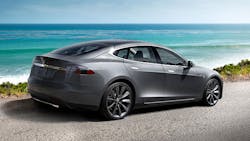Berlin to Tesla: Stop Ads with 'Misleading' Autopilot Term
Germany wants Tesla to stop advertising the "autopilot" function on its cars because it leads to false customer expectations, as the system comes under scrutiny following two fatal crashes.
Transport regulator KBA has written to the company, telling it: "In order to prevent misunderstandings and false expectations from clients, we are asking that the misleading term 'Autopilot' no longer be used in advertisements for the system."
The KBA letter cited in Bild am Sonntag was confirmed by the transport ministry.
Germany has been conducting an investigation into the autopilot system in vehicles made by electric carmaker Tesla, which has been available with its Model S series since October 2015.
Questions have been raised over the system after two fatal crashes, one in northern China in January and another in the US state of Florida in May.
In September, a Tesla electric car crashed into a tourist bus on a motorway in northern Germany, lightly injuring the driver who said he had activated the vehicle's autopilot system.
At the time, Tesla said the driver had confirmed the autopilot was "functioning properly and... was unrelated to the accident."
Last week, a Tesla spokesman said: "We have always been clear with our customers that Autopilot is a driver's assistance system that requires the driver to pay attention at all times."
The system allows the vehicle to automatically change lanes, manage speed and brake to avoid a collision. The system may be overridden by the driver.
Consumer activists have called on the company, founded by PayPal billionaire Elon Musk, to disable the autopilot feature until it is updated to detect whether the driver's hands are on the steering wheel during operation -- as the company says should be the case.
About the Author
Agence France-Presse
Copyright Agence France-Presse, 2002-2025. AFP text, photos, graphics and logos shall not be reproduced, published, broadcast, rewritten for broadcast or publication or redistributed directly or indirectly in any medium. AFP shall not be held liable for any delays, inaccuracies, errors or omissions in any AFP content, or for any actions taken in consequence.
